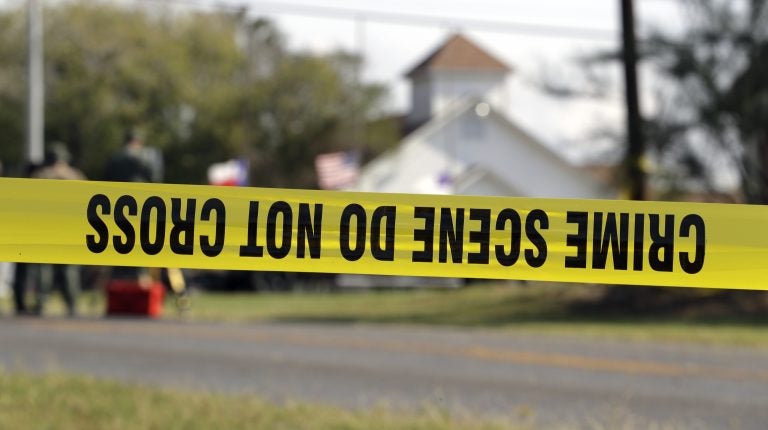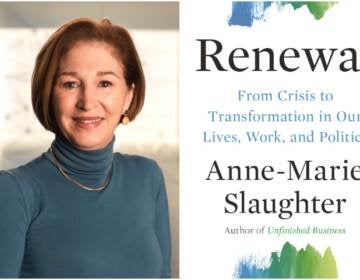Impossible gun violence is an accomplished fact in the United States
The question of possibility and impossibility no longer applies. Now we ask ourselves: "How many dead?" "ISIS or white supremacist?" "Did it happen close to me?"

A man opened fire inside the First Baptist Church of Sutherland Springs, Texas, on Sunday, Nov. 5, killing and wounding many. (AP Photo/Eric Gay)
“Ma queste cose sono impossibili!”
Impossible. These things. Are. Impossible.
Standing in the porticoed courtyard of the palazzo where I lived recently, I watched one housemate broodingly smoke a cigarette while another brandished that most typical of Italian gestures, that pecking, beaklike formation of the fingers, with a spastic energy excessive even for an Italian. To an American, it is a gesture as comical as it is quaint, but here in Italy it spoke volumes.
Sutherland Springs, Texas, a tiny community of about 600, reduced by 4 percent in mere minutes, is about as foreign a place as any Italian could imagine.
Another few hundred, few dozen, half dozen: dead. Dead at the hands of that perennial figure, by now a stock character in the American imagination, the “lone gunman” — a disaffected white male supremacist; a domestically radicalized ISIS sympathizer; a lonely, maladjusted, mentally unbalanced individual who, by virtue of a hyperbolic interpretation of our Second Amendment, has managed to acquire a few too many deadly firearms.
Here in Italy, one firearm is too many. People are allowed to own hunting rifles, used exclusively within the confines of game reserves. And on rare occasions, for those who can justify the need for self defense, based on their profession, one can get a concealed carry license, which is very difficult to obtain.
For two years I’d been living with five Italians and two Spaniards in the heart of Bologna, home to the oldest university in the Western world, pursuing a master’s degree in Italian studies.
Bologna is Italy’s No. 1 hotspot for Erasmus, Europe’s international student exchange program, and therefore the best city in the country for interacting with people from all over the world. Americans are rarely to be found, so I’m almost always the only one of my ilk in any given social situation. The question most often put to me, an unlikely and unqualified ambassador to my country, is “Why do you guys love guns so much?”
I believe there is a key psychological factor that makes life in Europe different from life in America. I’d venture to say that Europeans live and move with a degree of self-assurance unknown in the U.S. Self-assurance is not confidence. Confidence is the sense of ease that results from fluency in a certain set of skills. Self-assurance originates from a different source altogether: the knowledge that your government will take care of you in times of sickness, and that the likelihood of dying a victim of gun violence is very, very minimal.
Suicide, traffic accidents, incurable diseases and, yes, gun violence are facts of life in Europe, as they are everywhere in the world, but when confronted with questions of “how” and “why” so soon after a tragedy of such proportions as Sutherland Springs, I feel the burden of my country’s singular sin.
Most of the people I’ve met here know how to approach the question with a bit more delicacy than my housemate, but something about his nervous energy, the way it seized upon this nugget of American atrocity, seems to vivify the matter at stake.
“Ma queste cose sono impossibili!” These things are impossible. Yet they happened. And here I am, utterly incapable of even beginning to tease apart all of the whys and wherefores. In this word, “impossible” — a word Italians often use to describe realities which are, in fact, highly possible (it’s “impossible” to put formaggio on seafood pasta) — I see a fracture appear in the European armor of self-assurance. It’s not fear that my housemate expressed, but rather frustration. He believes the proper place for such horrors is in the realm of fantasy.
Granted, the barbarisms of the past century, those of two world wars, were unimaginable acts of evil. And yes, the unparalleled level of corruption in Italian politics is hopeless and shameful. And yes, the world is driven by greed and consumption. But still, greed and corruption and consumption operate by a certain kind of logic. There is a sort of arithmetic in the actions bred by evil, but this thing that happened … it makes no sense.
“Why do you guys love guns so much?” To answer such a question honestly would mean articulating a dreadful suspicion I have long held — that a great many of us in the U.S. have an uncanny ability to eliminate the human element from the conversation as if it were just one of the many variables at play.
At home in America, our debates on gun control are often couched in partisan rhetoric, meaning we’re almost never forced to confront the question of life or death at face value. We tend to make an entire spectrum of assumptions about people based on which side of the debate they fall on. But finding myself in the position of explaining the American debate in a second language, the absolute absurdity of it becomes immediately apparent. I’m not capable of describing just how utterly tribal and cutthroat we’ve become as a nation — nor, most importantly, how indifferent we the comfortable have grown to the reality of death. Death is Jason Statham unloading a magazine in the general direction of assorted miscreants; death is an inconvenient fate befalling a loved one at the end of a long, hard battle; death is a statistic.
Sure, people from other countries think their parliaments are just as dysfunctional, their bureaucracies just as maddening (much more so in Italy’s case), and their politicians just as corrupt, but the simple fact remains that scores of innocents are not frequently killed and maimed at random in their first-world countries.
Setting aside the issue of gun ownership in general, I can’t conceive of how anyone can justify owning a single assault weapon let alone a stockpile.
“Well, you see after the Revolutionary War there were legitimate concerns that the British would come back to reclaim their colonies, therefore it’s essential that we forgo background checks on potential purchasers of firearms made for war. Unlike in your country, we have to think and pray away the more-than-occasional mass murder of innocent civilians. But, hey, at least we don’t have to put the Queen on our money!”
If you’re inclined to believe that these atrocities are the price we have to pay for “freedom,” then I wonder if you’d be willing to let a loved one die at the hands of a lone psychopath for this “freedom.” Being slaughtered by a mentally unsound person is not a scenario any American should have to fear, nor is making some legislative changes for the sake of preventing such scenarios a big ask. The number of murders committed by homegrown terrorists far outweighs the number of those committed by foreign-born terrorists. The gun lobbies are among the most influential entities in Congress.
In a few months from now, it’ll happen again. By that time, I’ll probably be back stateside, and everyone I know will, more or less, share my stance on the issue. The same platitudes will be proffered, and the same diatribes indulged in. But it’s doubtful that anyone will look to me to answer the simple question “why?”
The answer has something to do with freedom, something to do with hate, and something to do with the way the free market exploits the worst parts of human nature. Or maybe the desire to shoot at things is simply baked into our national character.
Our most recent mass shooting, six killed and 12 injured outside of a school in rural California, was “tame” compared to Las Vegas and Sutherland Springs. With great shame I admit that my first instinct upon reading the headlines was to skip straight to the numbers — “How many dead?” — and then measure my reaction accordingly. The question of possibility and impossibility no longer applies. Now we ask ourselves: “How many dead?” “ISIS or white supremacist?” “Did it happen close to me?” Maybe such things were once impossible. But now, far from impossible, more than just possible, they are an accomplished fact.
—
Nicholas Castellucci is a Philadelphia native and a graduate of Temple University. He is currently pursuing a master’s degree in Italian studies, European literary cultures, and linguistics at the Alma Mater Studiorum – University of Bologna in Italy. As an undergraduate, he studied education and is currently a certified teacher of Italian and English as a second language. When he’s not cramming for an oral exam, he’s most likely watching “Mystery Science Theater 3000” and eating pasta.
WHYY is your source for fact-based, in-depth journalism and information. As a nonprofit organization, we rely on financial support from readers like you. Please give today.




